宾语从句用法详解
宾语从句用法详解 史上最小白的讲解与练习
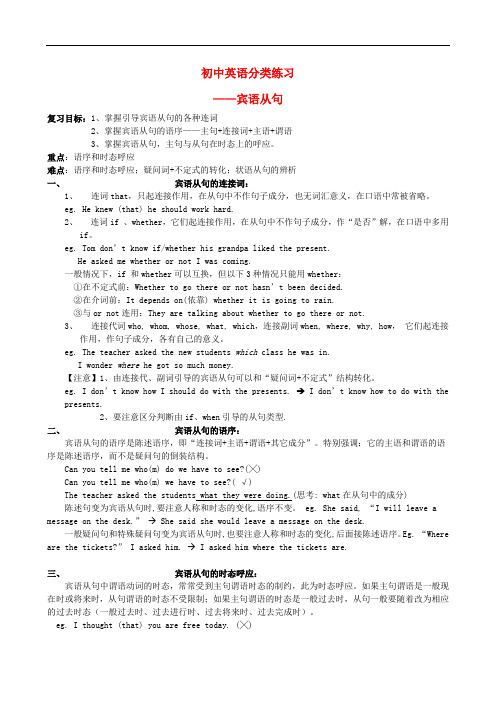
初中英语分类练习——宾语从句复习目标:1、掌握引导宾语从句的各种连词2、掌握宾语从句的语序——主句+连接词+主语+谓语3、掌握宾语从句,主句与从句在时态上的呼应。
重点:语序和时态呼应难点:语序和时态呼应;疑问词+不定式的转化;状语从句的辨析一、宾语从句的连接词:1、连词that,只起连接作用,在从句中不作句子成分,也无词汇意义,在口语中常被省略。
eg. He knew (that) he should work hard.2、连词if 、whether,它们起连接作用,在从句中不作句子成分,作“是否”解,在口语中多用if。
eg. Tom don’t know if/whether his grandpa liked the present.He asked me whether or not I was coming.一般情况下,if 和whether可以互换,但以下3种情况只能用whether:①在不定式前:Whether to go there or not hasn’t been decide d.②在介词前:It depends on(依靠) whether it is going to rain.③与or not连用:They are talking about whether to go there or not.3、连接代词who, whom, whose, what, which,连接副词when, where, why, how,它们起连接作用,作句子成分,各有自己的意义。
eg. The teacher asked the new students which class he was in.I wonder where he got so much money.【注意】1、由连接代、副词引导的宾语从句可以和“疑问词+不定式”结构转化。
eg. I don’t know how I should do with the presents. →I don’t know how to do with the presents.2、要注意区分判断由if、when引导的从句类型.二、宾语从句的语序:宾语从句的语序是陈述语序,即“连接词+主语+谓语+其它成分”。
宾语从句用法详解
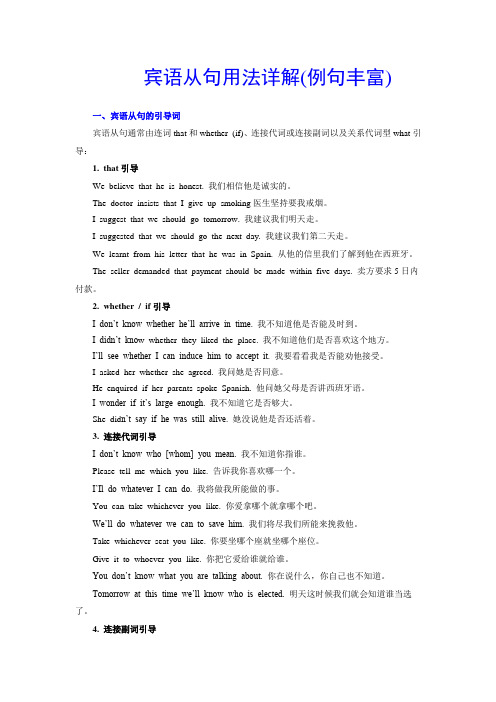
宾语从句用法详解(例句丰富)一、宾语从句的引导词宾语从句通常由连词that和whether (if)、连接代词或连接副词以及关系代词型what引导:1. that引导We believe that he is honest. 我们相信他是诚实的。
The doctor insists that I give up smoking医生坚持要我戒烟。
I suggest that we should go tomorrow. 我建议我们明天走。
I suggested that we should go the next day. 我建议我们第二天走。
We learnt from his letter that he was in Spain. 从他的信里我们了解到他在西班牙。
The seller demanded that payment should be made within five days. 卖方要求5日内付款。
2. whether / if引导I don’t know whether he’ll arrive in time. 我不知道他是否能及时到。
I didn’t kno w whether they liked the place. 我不知道他们是否喜欢这个地方。
I’ll see whether I can induce him to accept it. 我要看看我是否能劝他接受。
I asked her whether she agreed. 我问她是否同意。
He enquired if her parents spoke Spanish. 他问她父母是否讲西班牙语。
I wonder if it’s large enough. 我不知道它是否够大。
She did n’t say if he was still alive. 她没说他是否还活着。
3. 连接代词引导I don’t know who [whom] you mean. 我不知道你指谁。
(完整版)宾语从句用法详解
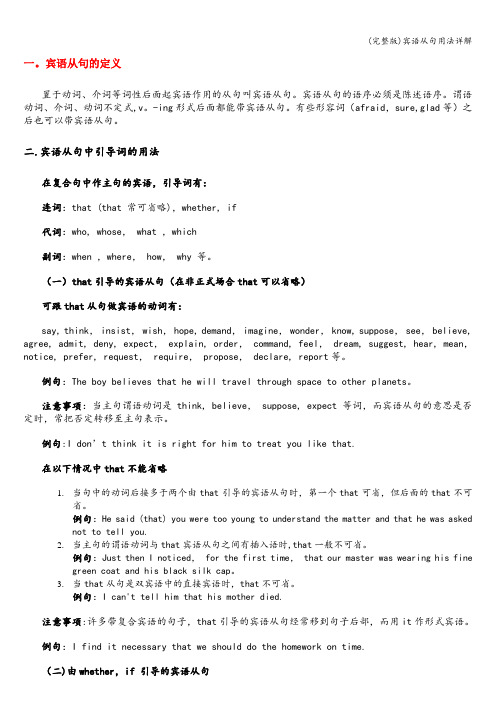
一。
宾语从句的定义置于动词、介词等词性后面起宾语作用的从句叫宾语从句。
宾语从句的语序必须是陈述语序。
谓语动词、介词、动词不定式,v。
-ing形式后面都能带宾语从句。
有些形容词(afraid,sure,glad等)之后也可以带宾语从句。
二.宾语从句中引导词的用法在复合句中作主句的宾语,引导词有:连词:that (that 常可省略),whether, if代词:who, whose, what ,which副词:when ,where, how, why 等。
(一)that引导的宾语从句(在非正式场合that可以省略)可跟that从句做宾语的动词有:say, think, insist, wish, hope, demand, imagine, wonder, know, suppose, see, believe, agree, admit, deny, expect, explain, order, command, feel, dream, suggest, hear, mean,notice, prefer, request, require, propose, declare, report等。
例句:The boy believes that he will travel through space to other planets。
注意事项:当主句谓语动词是 think, believe, suppose, expect 等词,而宾语从句的意思是否定时,常把否定转移至主句表示。
例句:I don’t think it is right for him to treat you like that.在以下情况中that不能省略1.当句中的动词后接多于两个由that引导的宾语从句时,第一个that可省,但后面的that不可省。
例句:He said (that) you were too young to understand the matter and that he was askednot to tell you.2.当主句的谓语动词与that宾语从句之间有插入语时,that一般不可省。
英语语法中宾语从句的用法详解

英语语法中宾语从句的用法详解宾语从句是英语学习中的常用语法,涉及到时态的转换,下面我们来详解一下宾语从句。
1、主句是一般现在时,从句根据实际情况使用任何时态。
例句:She says (that) she works from Monday to Friday.她说她从周一至周五上班。
(从句是一般现在时)She says (that) she will leave a message on his desk.她说她要在他桌子上留个便条。
(从句是一般将来时)2、主句是过去时态,从句须用过去时态的某种形式。
例句:He said there were no classes yesterday afternoon.他说昨天下午没有课。
(从句是一般过去时)He said (that) he was going to take care of the baby.他说他会去照看这个婴儿。
(从句是过去将来时)3、当宾语从句表示的是一个客观真理或者事实时,即使主句是过去时,从句也用一般现在时态。
例句:The teacher told us(that) nothing is difficult if we put our hearts into it.老师告诉我们世上无难事,只怕有心人。
She said(that) her father is twenty-eight years older thanher.她说她父亲比她大二十八岁。
He said that light travels much faster than sound.他说光比声音传播得快。
注意:当主句的谓语动词是think或believe,宾语从句要表达否定时,要把从句的否定转移到主句上。
I don't think he is going to help you with your English.我认为他不会帮你学英语的,这句话不可以翻译成:I think he isn't going to help you with your English.如果宾语从句有它的补语时,宾语从句用it代替,从句后置。
宾语从句专项讲解及练习(有答案)
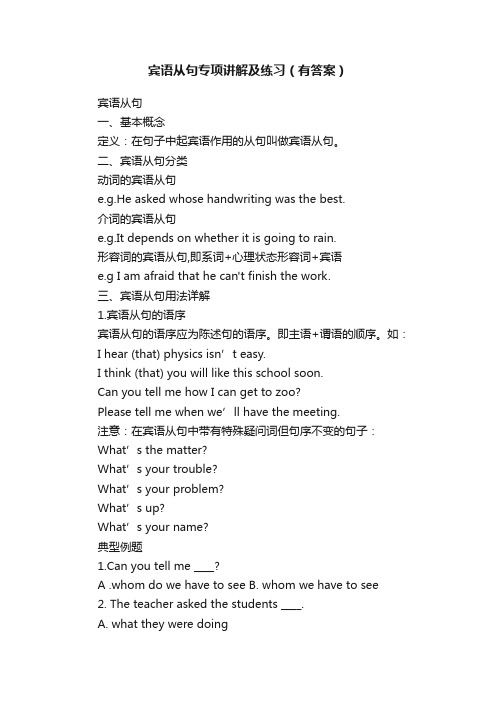
宾语从句专项讲解及练习(有答案)宾语从句一、基本概念定义:在句子中起宾语作用的从句叫做宾语从句。
二、宾语从句分类动词的宾语从句e.g.He asked whose handwriting was the best.介词的宾语从句e.g.It depends on whether it is going to rain.形容词的宾语从句,即系词+心理状态形容词+宾语e.g I am afraid that he can't finish the work.三、宾语从句用法详解1.宾语从句的语序宾语从句的语序应为陈述句的语序。
即主语+谓语的顺序。
如:I hear (that) physics isn’t easy.I think (that) you will like this school soon.Can you tell me how I can get to zoo?Please tell me when we’ll hav e the meeting.注意:在宾语从句中带有特殊疑问词但句序不变的句子:What’s the matter?What’s your trouble?What’s your problem?What’s up?What’s your name?典型例题1.Can you tell me ____?A .whom do we have to see B. whom we have to see2. The teacher asked the students ____.A. what they were doingB. what were they doing3. She wants to know____.A. where does he liveB. Where he lives4. Her father asked _____.A. who the tallest isB. who is the tallest5.Do you know ____?A. what is on the desk B . what on the desk is答案:BABBA2.宾语从句的时态1). 若主句时态是一般现在时,宾语从句该用什么时态就用什么时态。
宾语从句用法详解.doc

初中英语分类练习——宾语从句复习目标:1、掌握引导宾语从句的各种连词2、掌握宾语从句的语序——主句+连接词+主语+谓语3、掌握宾语从句,主句与从句在时态上的呼应。
重点:语序和时态呼应难点:语序和时态呼应;疑问词+不定式的转化;状语从句的辨析一、宾语从句的连接词:1、连词that,只起连接作用,在从句中不作句子成分,也无词汇意义,在口语中常被省略。
eg. He knew (that) he should work hard.2、连词if 、whether,它们起连接作用,在从句中不作句子成分,作“是否”解,在口语中多用if。
eg. Tom don’t know if/whether his grandpa liked the present.He asked me whether or not I was coming.一般情况下,if 和whether可以互换,但以下3种情况只能用whether:①在不定式前:Whether to go there or not hasn’t been decide d.②在介词前:It depends on(依靠) whether it is going to rain.③与or not连用:They are talking about whether to go there or not.3、连接代词who, whom, whose, what, which,连接副词when, where, why, how,它们起连接作用,作句子成分,各有自己的意义。
eg. The teacher asked the new students which class he was in.I wonder where he got so much money.【注意】1、由连接代、副词引导的宾语从句可以和“疑问词+不定式”结构转化。
eg. I don’t know how I should do with the presents. →I don’t know how to do with the presents.2、要注意区分判断由if、when引导的从句类型.二、宾语从句的语序:宾语从句的语序是陈述语序,即“连接词+主语+谓语+其它成分”。
宾语从句及感叹句

宾语从句宾语从句用法详解置于动词、介词等词性后面起宾语作用的从句叫宾语从句。
宾语从句的语序必须是陈述语序。
谓语动词、介词、动词不定式,v.-ing形式后面都能带宾语从句。
有些形容词(afraid,sure,glad等)之后也可以带宾语从句。
二.宾语从句中引导词的用法在复合句中作主句的宾语,引导词有:连词:that (that 常可省略),whethe r, if代词:who, whose, what ,which副词:when ,where, how, why 等。
五. that引导的宾语从句(在非正式场合t hat可以省略)可跟that从句做宾语的动词有:say, think, insist, wish, hope, demand, imagin e, wonder, know, suppos e, see, believ e, agree, admit,deny, expect, explai n, order, comman d, feel, dream,sugge s t, hear, mean, notice, prefer, reques t, requir e, propos e, declar e, report等。
例句:The boy believ es that he will travel throug h spaceto otherplanet s.注意事项:当主句谓语动词是 think, believ e, suppos e, expect等词,而宾语从句的意思是否定时,常把否定转移至主句表示。
例句:I don‘t thinkit is rightfor him to treatyou like that.在以下情况中t hat不能省略1.当句中的动词后接多于两个由tha t引导的宾语从句时,第一个tha t可省,但后面的th at不可省。
英语宾语从句用法详解

英语宾语从句用法详解英语宾语从句是一个句子作为动词的宾语,一般由连词引导。
宾语从句可以出现在形容词、动词、名词的后面。
1. 形容词后面的宾语从句:形容词常用于某些短语动词后面,如believe, think, know, feel, understand, doubt等。
例如:- I believe that he is right.- She knows what she wants.- I doubt if they will come.- Do you understand what I'm saying?2. 动词后面的宾语从句:动词后面的宾语从句可以是及物动词或短语动词的宾语。
例如:- She said that she was tired.- He asked if I wanted anything to eat.- They want to know where we are going.- We saw that they were arguing.根据从句的内容和从句所在的动词,宾语从句可以有以下几种类型:- 陈述句型:that引导的从句,表示陈述或描述。
例如:She said that she would come.- 一般疑问句型:由疑问词引导的从句,以完整疑问句的形式出现。
例如:He asked me where I lived.- 特殊疑问句型:由疑问词引导的从句,以特殊疑问句的形式出现。
例如:Do you know what time it is?- 否定句型:由“whether...or not”或“if...not”引导的从句。
例如:I don't know whether he will come or not.3. 名词后面的宾语从句:名词后面的宾语从句通常由that引导,也可以使用其他连词引导,如whether, if, when, where等。
宾语从句用法详解(精编)

宾语从句用法详解一、宾语从句的定义比较:We know him. (简单句)主语S 谓语V 宾语OWe know that he likes English. (复合句)主语S 谓语V 主语S 谓语V 宾语S置于动词、介词等词性后面起宾语作用的从句叫宾语从句。
宾语从句的语序必须是陈述语序。
谓语动词、介词、动词不定式,v.-ing形式后面都能带宾语从句。
有些形容词(afraid,sure,glad等)之后也可以带宾语从句。
二.宾语从句中引导词的用法在复合句中作主句的宾语,引导词有:连词:that (that 常可省略),whether, if代词:who, whose, what ,which副词:when ,where, how, why 等。
(一)that引导的宾语从句(在非正式场合that可以省略)可跟that从句做宾语的动词有:say, think, insist, wish, hope, demand, imagine, wonder, know, suppose, see, believe, agree, admit, deny, expect, explain, order, command, feel, dream, suggest, hear, mean, notice, prefer, request, require, propose, declare, report等。
例句:The boy believes that he will travel through space to other planets.注意:A、否定前移:当主句谓语动词是think, believe, suppose, expect 等词,而宾语从句的意思是否定时,常把否定转移至主句表示。
例句:I don’t think it is right for him to treat you like that.B、在以下情况中that不能省略1、当句中的动词后接多于两个由that引导的宾语从句时,第一个that可省,但后面的that不可省。
宾语从句用法详解
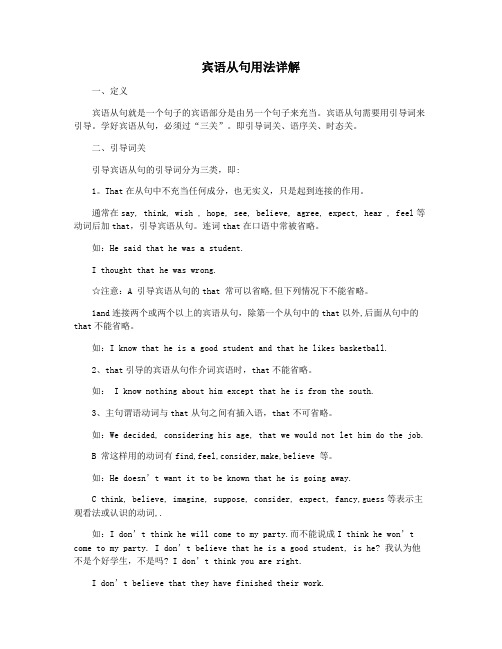
宾语从句用法详解一、定义宾语从句就是一个句子的宾语部分是由另一个句子来充当。
宾语从句需要用引导词来引导。
学好宾语从句,必须过“三关”。
即引导词关、语序关、时态关。
二、引导词关引导宾语从句的引导词分为三类,即:1。
That在从句中不充当任何成分,也无实义,只是起到连接的作用。
通常在say, think, wish , hope, see, believe, agree, expect, hear , feel等动词后加that,引导宾语从句。
连词that在口语中常被省略。
如:He said that he was a student.I thought that he was wrong.☆注意:A 引导宾语从句的that 常可以省略,但下列情况下不能省略。
1and连接两个或两个以上的宾语从句,除第一个从句中的that以外,后面从句中的that不能省略。
如:I know that he is a good student and that he likes basketball.2、that引导的宾语从句作介词宾语时,that不能省略。
如: I know nothing about him except that he is from the south.3、主句谓语动词与that从句之间有插入语,that不可省略。
如:We decided, considering his age, that we would not let him do the job.B 常这样用的动词有find,feel,consider,make,believe 等。
如:He doesn’t want it to be known that he is going away.C think, believe, imagine, suppose, consider, expect, fancy,guess等表示主观看法或认识的动词,.如:I don’t thin k he will come to my party.而不能说成I think he won’t come to my party. I don’t believe that he is a good student, is he? 我认为他不是个好学生,不是吗? I don’t think you are right.I don’t believe that they have finished their work.比较:she believes that I am not a good student.2常可以互换。
宾语从句用法详解
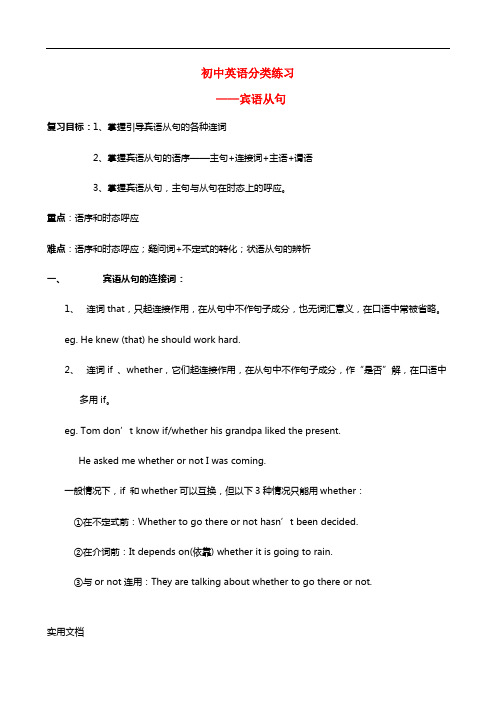
初中英语分类练习——宾语从句复习目标:1、掌握引导宾语从句的各种连词2、掌握宾语从句的语序——主句+连接词+主语+谓语3、掌握宾语从句,主句与从句在时态上的呼应。
重点:语序和时态呼应难点:语序和时态呼应;疑问词+不定式的转化;状语从句的辨析一、宾语从句的连接词:1、连词that,只起连接作用,在从句中不作句子成分,也无词汇意义,在口语中常被省略。
eg. He knew (that) he should work hard.2、连词if 、whether,它们起连接作用,在从句中不作句子成分,作“是否”解,在口语中多用if。
eg. Tom don’t know if/whether his grandpa liked the present.He asked me whether or not I was coming.一般情况下,if 和whether可以互换,但以下3种情况只能用whether:①在不定式前:Whether to go there or not hasn’t been decid ed.②在介词前:It depends on(依靠) whether it is going to rain.③与or not连用:They are talking about whether to go there or not.实用文档3、连接代词who, whom, whose, what, which,连接副词when, where, why, how,它们起连接作用,作句子成分,各有自己的意义。
eg. The teacher asked the new students which class he was in.I wonder where he got so much money.【注意】1、由连接代、副词引导的宾语从句可以和“疑问词+不定式”结构转化。
eg. I don’t know how I should do with the presents. I don’t know how to do with the presents.2、要注意区分判断由if、when引导的从句类型.二、宾语从句的语序:宾语从句的语序是陈述语序,即“连接词+主语+谓语+其它成分”。
宾语从句结构和用法总结详解
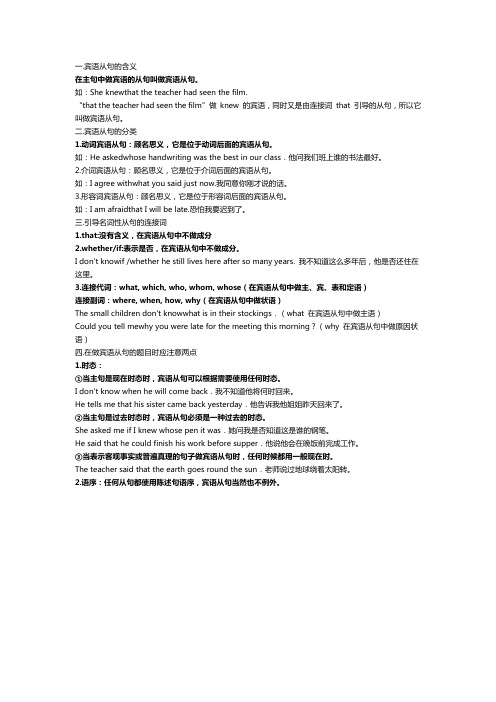
一.宾语从句的含义在主句中做宾语的从句叫做宾语从句。
如:She knewthat the teacher had seen the film.“that the teacher had seen the film”做knew 的宾语,同时又是由连接词that 引导的从句,所以它叫做宾语从句。
二.宾语从句的分类1.动词宾语从句:顾名思义,它是位于动词后面的宾语从句。
如:He askedwhose handwriting was the best in our class.他问我们班上谁的书法最好。
2.介词宾语从句:顾名思义,它是位于介词后面的宾语从句。
如:I agree withwhat you said just now.我同意你刚才说的话。
3.形容词宾语从句:顾名思义,它是位于形容词后面的宾语从句。
如:I am afraidthat I will be late.恐怕我要迟到了。
三.引导名词性从句的连接词1.that:没有含义,在宾语从句中不做成分2.whether/if:表示是否,在宾语从句中不做成分。
I don't knowif /whether he still lives here after so many years. 我不知道这么多年后,他是否还住在这里。
3.连接代词:what, which, who, whom, whose(在宾语从句中做主、宾、表和定语)连接副词:where, when, how, why(在宾语从句中做状语)The small children don't knowwhat is in their stockings.(what 在宾语从句中做主语)Could you tell mewhy you were late for the meeting this morning?(why 在宾语从句中做原因状语)四.在做宾语从句的题目时应注意两点1.时态:①当主句是现在时态时,宾语从句可以根据需要使用任何时态。
英语宾语从句用法详解(初中)
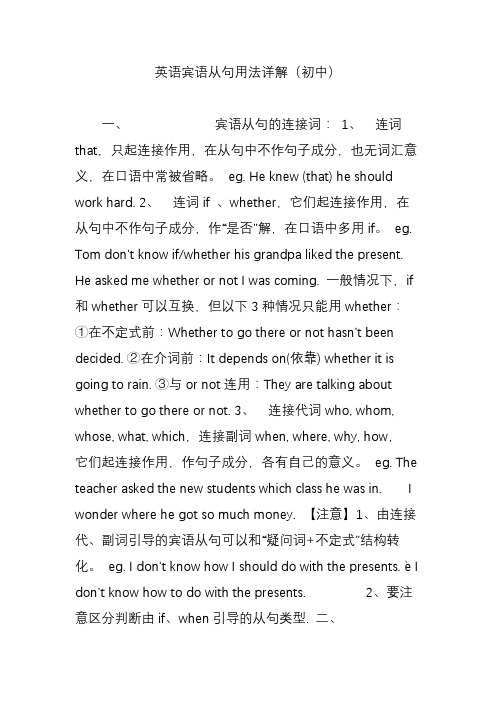
英语宾语从句用法详解(初中)一、宾语从句的连接词:1、连词that,只起连接作用,在从句中不作句子成分,也无词汇意义,在口语中常被省略。
eg. He knew (that) he should work hard. 2、连词if 、whether,它们起连接作用,在从句中不作句子成分,作“是否”解,在口语中多用if。
eg. Tom don’t know if/whether his grandpa liked the present. He asked me whether or not I was coming. 一般情况下,if 和whether可以互换,但以下3种情况只能用whether:①在不定式前:Whether to go there or not hasn’t been decided. ②在介词前:It depends on(依靠) whether it is going to rain. ③与or not连用:They are talking about whether to go there or not. 3、连接代词who, whom, whose, what, which,连接副词when, where, why, how,它们起连接作用,作句子成分,各有自己的意义。
eg. The teacher asked the new students which class he was in. I wonder where he got so much money. 【注意】1、由连接代、副词引导的宾语从句可以和“疑问词+不定式”结构转化。
eg. I don’t know how I should do with the presents. è I don’t know how to do with the presents. 2、要注意区分判断由if、when引导的从句类型. 二、宾语从句的语序:宾语从句的语序是陈述语序,即“连接词+主语+谓语+其它成分”。
宾语从句三类的用法详解_宾语从句 英语语法.doc

宾语从句三类的用法详解_宾语从句宾语从句可以分为三类(1).动词的宾语从句1.1 大多数位于动词后面Eg:I hope you can join us in the game.1.2 有些是动词+副词后Find out / point out / figure out / turn out/ figure outEg:Can you figure out what the poet really means in this poem?1.3 有些动词短语后面Make sure / make up ones mind / keep in mindEg; we should keep in mind that sports can be a great boost to our health.(2) it 作形式宾语代替宾语从句第一类动词; find/ feel/ think/ consider/ make / believe/ guess/ suppose /assume等后面有宾语不足语时,需要用it 作形式宾语而将that引导的真正的宾语从句后置。
Eg:I think it necessary that we do some sporting.第二类动词带宾语从句时需要在从句前面加it。
这类词:hate / like/ dislike/ appreciate/ depend on/ see to /Eg: I hate it when they talk without considering others feeling.但是如果宾语从句是WH-类引导的,其后面有to be 短语作宾语补足语,不可以用it 代替。
We all consider what you said to be unbelievable. (right)We all consider it to be unbelievable what you said .(wrong) (3) 形容词后的宾语从句Adj: sure / certain/ glad/ pleased/ happy / afraid / sorry 等等。
宾语从句三类的用法详解

宾语从句三类的用法详解(最新版)编制人:__________________审核人:__________________审批人:__________________编制学校:__________________编制时间:____年____月____日序言下载提示:英语语法是针对英语语言进行研究后,系统地总结归纳出来的一系列语言规则。
英语语法的精髓在于掌握语言的使用。
而且,英语语法是一套完整的语言知识体系。
如果你想英语能够更进一步,英语语法就是其中的主要一环。
Download tips: English grammar is a series of language rules that are systematically summarized after studying the English language. The essence of English grammar lies in mastering the use of language. Moreover, English grammar is a complete language knowledge system. If you want English to go further, English grammar is the main link.正文内容宾语从句可以分为三类(1).动词的宾语从句1.1 大多数位于动词后面Eg:I hope you can join us in the game.1.2 有些是“动词+副词”后Find out / point out / figure out / turn out/ figure outEg: Can you figure out what the poet really means in this poem?1.3 有些动词短语后面Make sure / make up one’s mind / keep in mindEg; we should keep in mind that sports can be a great boost to our health.(2) it 作形式宾语代替宾语从句第一类动词; find/ feel/ think/ consider/ make / believe/ guess/ suppose /assume等后面有宾语不足语时,需要用it 作形式宾语而将that引导的真正的宾语从句后置。
初中英语中的宾语从句用法详解
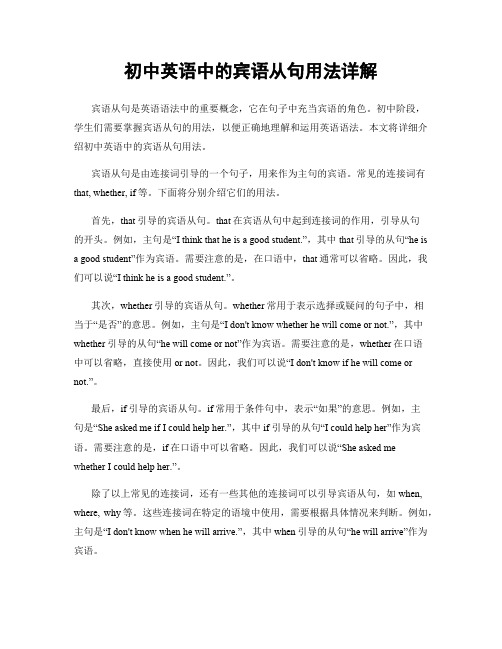
初中英语中的宾语从句用法详解宾语从句是英语语法中的重要概念,它在句子中充当宾语的角色。
初中阶段,学生们需要掌握宾语从句的用法,以便正确地理解和运用英语语法。
本文将详细介绍初中英语中的宾语从句用法。
宾语从句是由连接词引导的一个句子,用来作为主句的宾语。
常见的连接词有that, whether, if等。
下面将分别介绍它们的用法。
首先,that引导的宾语从句。
that在宾语从句中起到连接词的作用,引导从句的开头。
例如,主句是“I think that he is a good student.”,其中that引导的从句“he is a good student”作为宾语。
需要注意的是,在口语中,that通常可以省略。
因此,我们可以说“I think he is a good student.”。
其次,whether引导的宾语从句。
whether常用于表示选择或疑问的句子中,相当于“是否”的意思。
例如,主句是“I don't know whether he will come or not.”,其中whether引导的从句“he will come or not”作为宾语。
需要注意的是,whether在口语中可以省略,直接使用or not。
因此,我们可以说“I don't know if he will come or not.”。
最后,if引导的宾语从句。
if常用于条件句中,表示“如果”的意思。
例如,主句是“She asked me if I could help her.”,其中if引导的从句“I could help her”作为宾语。
需要注意的是,if在口语中可以省略。
因此,我们可以说“She asked me whether I could help her.”。
除了以上常见的连接词,还有一些其他的连接词可以引导宾语从句,如when, where, why等。
这些连接词在特定的语境中使用,需要根据具体情况来判断。
- 1、下载文档前请自行甄别文档内容的完整性,平台不提供额外的编辑、内容补充、找答案等附加服务。
- 2、"仅部分预览"的文档,不可在线预览部分如存在完整性等问题,可反馈申请退款(可完整预览的文档不适用该条件!)。
- 3、如文档侵犯您的权益,请联系客服反馈,我们会尽快为您处理(人工客服工作时间:9:00-18:30)。
宾语从句用法详解核心提示:宾语从句是主从复合句中最常见的从句之一。
它作及物动词、介词或者某些形容词的宾语。
由于宾语从句涉及到引导词、语序、时态等多方面的内容,所以宾语从句的用法一直是学习的重点难点。
本文对宾语从句的用法进行了详尽讲解并附有例句,望对中学生朋友有所帮助。
一.宾语从句的定义置于动词、介词等词性后面起宾语作用的从句叫宾语从句。
宾语从句的语序必须是陈述语序。
谓语动词、介词、动词不定式,形式后面都能带宾语从句。
有些形容词(afraid,sure,glad等)之后也可以带宾语从句。
二.宾语从句中引导词的用法在复合句中作主句的宾语,引导词有:连词:that (that 常可省略),whether, if代词:who, whose, what ,which副词:when ,where, how, why 等。
(一)that引导的宾语从句(在非正式场合that可以省略)可跟that从句做宾语的动词有:say, think, insist, wish, hope, demand, imagine, wonder, know, suppose, see, believe, agree, admit, deny, expect, explain, order, command, feel, dream, suggest, hear, mean, notice, prefer, request, require, propose, declare, report 等。
例句:The boy believes that he will travel through space to other planets.注意事项:当主句谓语动词是 think, believe, suppose, expect 等词,而宾语从句的意思是否定时,常把否定转移至主句表示。
例句:I don’t think it is right for him to treat you like that.在以下情况中that不能省略1.当句中的动词后接多于两个由that引导的宾语从句时,第一个that可省,但后面的that不可省。
例句:He said (that) you were too young to understandthe matter and that he was asked not to tell you.2.当主句的谓语动词与that宾语从句之间有插入语时,that一般不可省。
例句:Just then I noticed, for the first time, thatour master was wearing his fine green coat and hisblack silk cap.3.当that从句是双宾语中的直接宾语时,that不可省。
例句:I can’t tell him that his mother died.注意事项:许多带复合宾语的句子,that引导的宾语从句经常移到句子后部,而用it作形式宾语。
例句:I find it necessary that we should do the homework on time.(二)由whether,if 引导的宾语从句由whether(if)引导的宾语从句,实际上是一般疑问句演变而来的。
意思是“是否”。
宾语从句要用陈述句语序。
一般说来,在宾语从句中whether与if可以互换使用,但在特殊情况下if与whether 是不能互换的。
例句:I wonder whether(if) they will come to our party.只能用whether,不能用if引导的宾语从句1.在带to的不定式前例句:We decided whether to walk there.2.在介词的后面例句:I’m thinking of whether we should go to see thefilm.3.在动词后面的宾语从句时例句:We discussed whether we had a sports meeting nextweek4.直接与or not连用时例句:I can’t say whether or no t thet can come on time.只能用if不能用whether引导的宾语从句1.if引导条件状语从句,意为“如果”例句:The students will go on a picnic if it is sunny.2.if引导否定概念的宾语从句时例句:He asked if I didn’t come to school yesterday.3.引导状语从句even if(即使)和as if(好象)时例句:He talks as if he has known all about it.(三)连接代词和连接副词引导的宾语从句这样的宾语从句实际上是由特殊疑问句变化而来的,宾语从句要用陈述句语序。
用于这种结构的动词常常是:see, say, tell, ask, answer, know, decide, show, find out, imagine, suggest, doubt, wonder, discover, understand, inform, advise等。
英语中的连接代词有:who,whom,whose,which,what,在句中担任主语、宾语、定语或者表语。
例句:Can you tell me whom you are waiting for?英语中的连接副词有:when,where,why,how,在句中担任状语的成分。
例句:None of us knows where these new parts can be bought.三.宾语从句的语序宾语从句的语序是陈述句语序即:连接代词/副词+主语+谓语+其他成分。
例句如下:1.I don’t know what they are looking for.2.Could you tell me when the train will leave?3.Can you imagine what kind of man he is?四.宾语从句的时态1.主句是一般现在时,从句根据实际情况使用任何时态。
例句:The headmaster hopes everything goes well.2.主句是过去时态,从句须用过去时态的某种形式。
例句:She was sorry that she hadn’t finished her workon time.3.当宾语从句表示的是一个客观真理或者事实时,即使主句是过去时,从句也用一般现在时态。
例句:The teacher told his class that light travelsfaster than sound.五.宾语从句的特点1.宾语从句可以作及物动词、介词及形容词的宾语。
2.宾语从句的语序一律用陈述句语序。
3.连接词that引导宾语从句在句中无词义,不充当句子成份,多数情况下可以省略。
4.whether 和 if 都可引导宾语从句,但 whether后可紧跟or not;whether从句可作介词的宾语。
5.如果从句太长,可以用形式宾语it.使用口诀法学习初中英语语法核心提示:口诀法是《全神贯注》学习软件的教学特色之一,使用口诀法学习英语语法不仅可以节省学习时间还能培养概括思维能力和英语学习兴趣。
现将初中英语语法口诀总结如下,望对广大初中生朋友有所帮助。
1.48个国际音标助记口诀国际音标四十八、个个都要记清它,元音单、双二十整,辅音清、浊二十八。
单元音又分中、前、后,依次各有二、四、六,双元音数也是双,正好八个不要漏。
辅音虽多也别慌,清浊成对有十双,剩下[h][r][l][j][w],还有鼻音[m] [n] [ŋ]。
有气无声清辅音,有声无气浊辅音,发音特点应掌握。
2.be动词用法口诀我用am,你用are,is连着他,她,它;单数名词用is,复数名词全用are。
变疑问,往前提,句末问号莫丢弃。
变否定,更容易,be后not莫忘记。
疑问否定任你变,句首大写莫迟疑。
3.开音节与闭音节区分口诀开音节,音节开,一元字母在后排;不怕一辅堵后门,还有哑e在门外。
闭音节,音节闭,一元字母生闷气;辅音字母堵后门,一元字母音短急。
4.英语词类口诀句子要由词组成,英语词类有十种:句中成分用实词,名、代、动、副、数、形容;冠、介、连词和感叹,虚词附加或沟通;词类功能掌握了,造句之时好运用。
5.英语语序口诀主、谓、宾、表同汉语,定语有同也有异。
状语位置更特殊,不能全和汉语比。
6.肯定句变一般疑问句口诀have和be提句首,其它助词Do开头。
时间、人称由do变,动词只把原形留。
谓语助词有几个,第一助词提句首。
7.肯定句变否定句口诀否定词语加not,放在be和have后;其它要加动词do,do的后面加not;时间、人称由do变,动词原形总保留;谓语若是助词多,not紧跟第一个。
8.名词所有格变化口诀名词只变数,不分主宾格。
人和动物类,可变所有格。
撇后加s,相当汉语“的”。
时间、距离等,也变所有格。
9.名词变复数口诀单数变为复数式,加上“s”统言之。
下列结尾名词后,要加“s”先加“e”:发音[∫][t∫][s]和[z],或是辅音加“o”时。
有些名词变复数,词尾变化要注意:“y”前字母是辅音,一律变“y”为“ie”;遇到“f/fe”,有时需要变“ve”;少数名词不规则,特别情况靠硬记。
10.时间名词前所有介词的速记口诀年月周前要用in,日子前面却不行。
遇到几号要用“on”,上午下午又是“in”。
要说某日上下午,用on换in才能行。
午夜黄昏用at,黎明用它也不错。
at也在时分前,说“差”用to,说“过”要用past。
11.速记口诀介词加宾语,才能有实意。
表、定、状、宾、补,词组在句里。
in 在……里,out在……外,在旁边的是beside,靠近的为by。
on在……上,under在……下,above在上头,below在底下。
12.动词的时态变化口诀四种时间各四式,联想对比便于记。
时间现在和过去,各自还有将来时。
一般、完成、进行式,完成进行是四式。
四四共有十六种,看来复杂掌握易;除去have/be以外,动词变化有规律。
13.动词形式变化口诀动词根本是原形,变化形式有四种:原形词尾加“s”,现在第三单人称;过去原形加“ed”,过去分词也相同;原形加上“ing”,现在分词或动名。
原形词尾加“s”,如同名词复数式。
若加“ed/ing”,以下情况要注意:词尾有ie只加d,Ing去掉无声e;词尾ie变成y,然后再加ing;辅音之后y结尾,y要变i加ed;现在分词不变y,直接加上ing;词尾重读闭音节,结尾辅音都双写,r做结尾也一样,重读音节r双写;结尾字母若是“t”,不是重读也双写。
